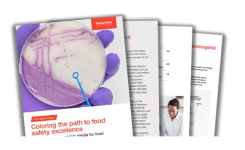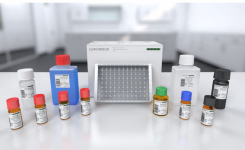Eppendorf® twin.tec Plates Specially Designed for PCR
go back to news archives| Eppendorf® twin.tec PCR plates give you the advantages that come from combining two materials: the wells are manufactured from virgin polypropylene, the most successful material used for PCR tubes; polycarbonate, an especially rigid material, forms the plate deck and the skirt. This one-piece design is achieved by an innovative injection moulding process, twin-shot technology. Polycarbonate enhances the mechanical stability and facilitates handling for the twin.tec PCR plates. Its enhanced stiffness guarantees improved plane parallelism in the plate deck before, during and after PCR, thus ensuring a more secure seal. Minimum sagging of the skirt makes the plate the ideal choice for use in automation and in conjunction with robots. All these features are nevertheless of equal use to molecular biologists working in manual operation, because the visible outcome is a batch of more reliable PCR results. Polypropylene gives the wells an inert, non-wetting surface that prevents DNA, RNA and enzymes from binding and improves recovery even when you are working with the most minute volumes. Compared to the common thin-walled tubes, Eppendorf twin.tec PCR plates offer a further 20% reduction in wall thickness. This provides an ideal snug fit for the well against the thermal block and ensures virtually undisturbed heat transfer from the block to the sample. Raised well rims optimize sealing effectivity and reduce the risk of cross contamination. All commonly used sealing methods can be applied: cap strips, adhesive films and foils - and for best protection against evaporation, heat sealing. Eppendorf's certified purity standard - 'PCR clean' - guarantees that the product is free of human DNA, DNase, RNase and PCR inhibitors. |
NOTE: This item is from our 'historic' database and
may contain information which is not up to date.
Source : Eppendorf AG View Company Information
Posted on April 29, 2008
















